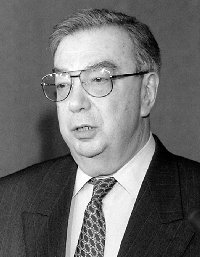The Great Consultant

He walked down the ramp from his government jet with a purposefully cheerful gait, an aging man squinting through his glasses, with an all-knowing nomenklatura smile at the welcome committee. Premier Yevgeny Primakov, perhaps today's most influential Russian politician, was to visit the city of his birth, although he has never actually lived in Kyiv, spending his childhood in Soviet Georgia whence he set off to conquer the political summits in Moscow. But the fact remains that he was born in the Ukrainian capital, which is even more interesting in that this was his first visit as an independent politician capable of determining the future of Russian-Ukrainian relations.
Mr. Primakov seemed confident when he was at the helm of Soviet foreign policy; he was an inveterate enemy of NATO expansion and made a point of ignoring, even scorning all central European desires. In the end they allowed him to save face: NATO was expanding despite Moscow's vigorous protests and an act was signed with Russia which has apparently turned out an empty-worded declaration. An enraged Primakov did not even attend the Madrid summit (and no one was terribly eagerly to see him there).
Something like that happened this time when Russia proved out unable to talk President Slobodan Milosevic into meeting NATO halfway. The Russian Premier's angry phraseology (whether his own or as a background for the President's or Foreign Minister's subsequent expostulations) echoed hollowly in NATO corridors. No one even bothered to respond. Moreover, when Mr. Primakov decided to present his Belgrade partner's stubbornness as readiness to compromise, German Federal Chancellor Gerhard Schroeder, in the presence of his Russian counterpart, called a spade a spade. The Russian Premier had no choice but to continue blaming NATO.
These two episodes are very meaningful for Mr. Primakov's entire political career. He looks like a man who never makes mistakes, with whom compromise means doing things his way. This is the old Soviet school of diplomacy whose graduates spent years living comfortably attending international disarmament conferences, being in no hurry to change Geneva's amenities for socialist Moscow's special stores supplying goodies to the nomenklatura. True, his business lay in a somewhat different plane, but he remains flesh and blood of that successful Soviet intelligentsia stratum when even Jewish parentage (God forbid, of course!) was no obstacle in making careers in privileged academic institutions, also within the party apparatus (true, consulting was the ceiling, but then came perestroika).
One serious problem with this style is that Russia is now terribly pressed for time; it cannot wait until its Premier and his Cabinet of Red pensioners collect their thoughts and decide what is to be done about a Russian economy in death agony. Fear of final decisions and assuming responsibility are also hallmarks of that "consulting" style. Hence Mr. Primakov's utmost concentration, after getting the premiership, on a cautious (knowing Yeltsin, one has to watch one's step) accumulation of top-level power, seeking immunity guarantees with the aid of Duma marginal Leftists, plotting against the latter-day favorites (the Berezovsky saga being a case study). Under Primakov, Russia is little by little turning into a country of state capitalism, albeit without oligarchs but under full control of the omnipotent and invincible bureaucracy. And the bureaucrats are getting increasingly wary of those at the top of the political Olympus, for they can kick the warm comfortable seat from under any of them by selectively using the struggle against corruption. A society deprived of almost all independent and "oligarchic" media is practically unable to resist such processes. He who will finally wind up atop this pyramid will be happy and unhappy at the same time. Happy because he will wield such tremendous power. Unhappy because the pyramid is practically out of service; it is politically and economically ineffective.
Incidentally, no one can guarantee that Yevgeny Primakov will come out
on top. Anticipating complete fiasco unsettles quite a few of the elite
starting with the President. The government is being supported by Gennady
Ziuganov's people with a demonstrative zeal and members of the government
make no secret of their close contact with the Communists. This, too, casts
a shadow of doubt on the Cabinet's ability to finally make a decisive step
in the right direction. In addition, Mr. Primakov still hopes for changes.
He has already warned that he will resigned if they retire his Communist
First Deputy Yuri Masliukov and Agrarian Deputy Gennady Kulik. The press
insists that the two are corrupt. Moreover, Masliukov is known to have
bungled talks with the IMF. However, fiasco is by no means a negative reference
in today's government files. The reverse. It guarantees that a given bureaucrat
will continue as a consultant, rather than one capable of curing any of
his country's ills.
Newspaper output №:
№14, (1999)Section
Day After Day





